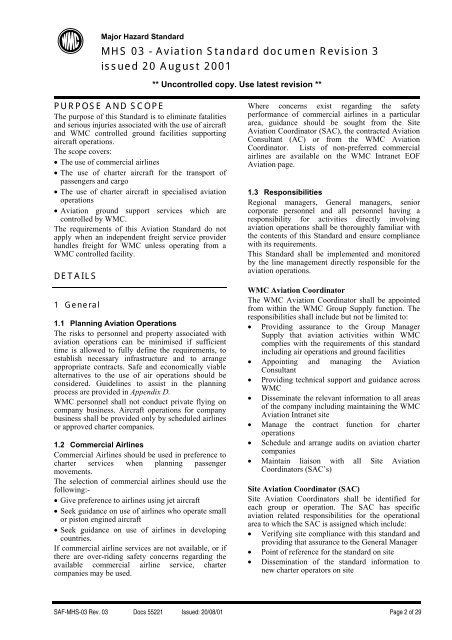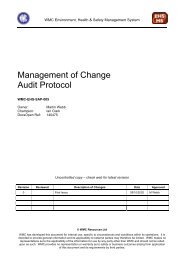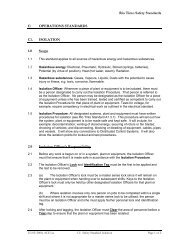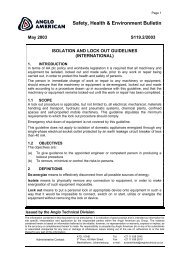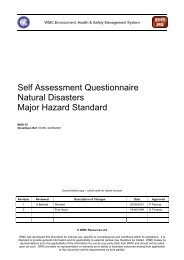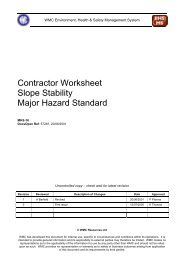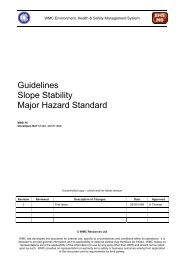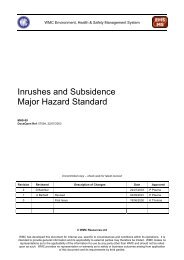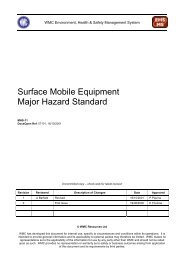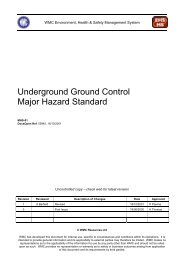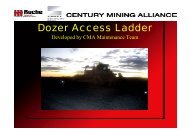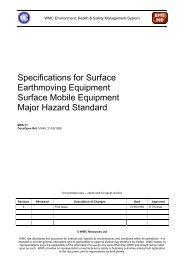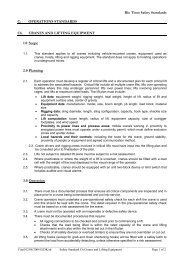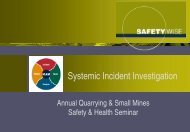Aviation Major Hazard Standard - MIRMgate
Aviation Major Hazard Standard - MIRMgate
Aviation Major Hazard Standard - MIRMgate
Create successful ePaper yourself
Turn your PDF publications into a flip-book with our unique Google optimized e-Paper software.
<strong>Major</strong> <strong>Hazard</strong> <strong>Standard</strong><br />
MHS 03 - <strong>Aviation</strong> <strong>Standard</strong> documen Revision 3<br />
issued 20 August 2001<br />
** Uncontrolled copy. Use latest revision **<br />
PURPOSE AND SCOPE<br />
The purpose of this <strong>Standard</strong> is to eliminate fatalities<br />
and serious injuries associated with the use of aircraft<br />
and WMC controlled ground facilities supporting<br />
aircraft operations.<br />
The scope covers:<br />
• The use of commercial airlines<br />
• The use of charter aircraft for the transport of<br />
passengers and cargo<br />
• The use of charter aircraft in specialised aviation<br />
operations<br />
• <strong>Aviation</strong> ground support services which are<br />
controlled by WMC.<br />
The requirements of this <strong>Aviation</strong> <strong>Standard</strong> do not<br />
apply when an independent freight service provider<br />
handles freight for WMC unless operating from a<br />
WMC controlled facility.<br />
DETAILS<br />
1 General<br />
1.1 Planning <strong>Aviation</strong> Operations<br />
The risks to personnel and property associated with<br />
aviation operations can be minimised if sufficient<br />
time is allowed to fully define the requirements, to<br />
establish necessary infrastructure and to arrange<br />
appropriate contracts. Safe and economically viable<br />
alternatives to the use of air operations should be<br />
considered. Guidelines to assist in the planning<br />
process are provided in Appendix D.<br />
WMC personnel shall not conduct private flying on<br />
company business. Aircraft operations for company<br />
business shall be provided only by scheduled airlines<br />
or approved charter companies.<br />
1.2 Commercial Airlines<br />
Commercial Airlines should be used in preference to<br />
charter services when planning passenger<br />
movements.<br />
The selection of commercial airlines should use the<br />
following:-<br />
• Give preference to airlines using jet aircraft<br />
• Seek guidance on use of airlines who operate small<br />
or piston engined aircraft<br />
• Seek guidance on use of airlines in developing<br />
countries.<br />
If commercial airline services are not available, or if<br />
there are over-riding safety concerns regarding the<br />
available commercial airline service, charter<br />
companies may be used.<br />
Where concerns exist regarding the safety<br />
performance of commercial airlines in a particular<br />
area, guidance should be sought from the Site<br />
<strong>Aviation</strong> Coordinator (SAC), the contracted <strong>Aviation</strong><br />
Consultant (AC) or from the WMC <strong>Aviation</strong><br />
Coordinator. Lists of non-preferred commercial<br />
airlines are available on the WMC Intranet EOF<br />
<strong>Aviation</strong> page.<br />
1.3 Responsibilities<br />
Regional managers, General managers, senior<br />
corporate personnel and all personnel having a<br />
responsibility for activities directly involving<br />
aviation operations shall be thoroughly familiar with<br />
the contents of this <strong>Standard</strong> and ensure compliance<br />
with its requirements.<br />
This <strong>Standard</strong> shall be implemented and monitored<br />
by the line management directly responsible for the<br />
aviation operations.<br />
WMC <strong>Aviation</strong> Coordinator<br />
The WMC <strong>Aviation</strong> Coordinator shall be appointed<br />
from within the WMC Group Supply function. The<br />
responsibilities shall include but not be limited to:<br />
• Providing assurance to the Group Manager<br />
Supply that aviation activities within WMC<br />
complies with the requirements of this standard<br />
including air operations and ground facilities<br />
• Appointing and managing the <strong>Aviation</strong><br />
Consultant<br />
• Providing technical support and guidance across<br />
WMC<br />
• Disseminate the relevant information to all areas<br />
of the company including maintaining the WMC<br />
<strong>Aviation</strong> Intranet site<br />
• Manage the contract function for charter<br />
operations<br />
• Schedule and arrange audits on aviation charter<br />
companies<br />
• Maintain liaison with all Site <strong>Aviation</strong><br />
Coordinators (SAC’s)<br />
Site <strong>Aviation</strong> Coordinator (SAC)<br />
Site <strong>Aviation</strong> Coordinators shall be identified for<br />
each group or operation. The SAC has specific<br />
aviation related responsibilities for the operational<br />
area to which the SAC is assigned which include:<br />
• Verifying site compliance with this standard and<br />
providing that assurance to the General Manager<br />
• Point of reference for the standard on site<br />
• Dissemination of the standard information to<br />
new charter operators on site<br />
SAF-MHS-03 Rev. 03 Docs 55221 Issued: 20/08/01 Page 2 of 29


